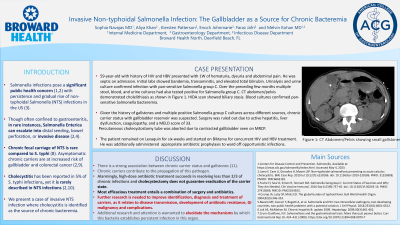Monday Poster Session
Category: Biliary/Pancreas
P1578 - Invasive Non-typhoidal Salmonella Infection: The Gallbladder as a Source for Chronic Bacteremia
Monday, October 23, 2023
10:30 AM - 4:15 PM PT
Location: Exhibit Hall

Has Audio

Sophia Navajas Urioste, MD
Broward Health North
Fort Lauderdale, FL
Presenting Author(s)
Sophia Navajas Urioste, MD1, Kiersten Patterson, MD2, Aliya Khan, MD1, Faraz Jafri, MD1, Enock Johnmarie, MD1
1Broward Health North, Deerfield, FL; 2Broward Health North Hospital, Deerfield Beach, FL
Introduction: Salmonella infections pose a significant public health concern (1, 2). The prevalence of serogroup C of non-typhoidal Salmonella (NTS) has been increasing in the United States (3). Though often confined to gastroenteritis, in rare instances, Salmonella can escalate into more severe symptomatology such as distal seeding, bowel perforation, or invasive disease (2,4), especially in individuals with weakened immune systems (5,6). Chronic fecal carriage of NTS is rare compared to S. typhi (7). Cholecystitis has been reported in 5% of S. typhi infections, yet it is rarely described in NTS infections (8,9). We present a case of invasive NTS infection where cholecystitis is identified as the source of chronic bacteremia.
Case Description/Methods: 59 year old patient with HIV and Hepatitis B presented with dysuria and abdominal pain. He was septic on admission with blood and urine culture returning positive for pan-sensitive Salmonella group C. Over the preceding months, multiple stool, blood, and urine cultures had also tested positive for this organism. CT abdomen/pelvis demonstrated mild bladder wall thickening and cholelithiasis. Surgery was ruled out due to active hepatitis, liver dysfunction, coagulopathy, and a MELD score of 33. MRCP revealed a contracted gallbladder and absent biliary dilation. While initially considered, percutaneous cholecystostomy tube was later decided against due to the contracted gallbladder. The patient completed a six-week course of Levaquin.
Discussion: Studies have found a strong association between chronic carrier status and gallstones with around 90% of chronic carriers having gallstones (10). Antibiotic-resistant strains of Salmonella pose a growing concern, as high-dose antibiotic treatment succeeds in resolving less than two-thirds of chronic infections. Cholecystectomy does not guarantee eradication of the carrier state (10). While not feasible for many patients, the most efficacious treatment entails a combination of surgery and antibiotics.
It is crucial to identify and treat NTS patients who are chronic carriers of infection, as they serve as key reservoirs for the further dissemination of the disease. Management of this patients is complicated due to limited effectiveness in resolving chronic colonization. Further research is needed to elucidate the mechanisms of persistent infection and improve identification, diagnosis and treatment of carries, as it relates to disease transmission, the development of antibiotic resistance, GI malignancy and complications.
Disclosures:
Sophia Navajas Urioste, MD1, Kiersten Patterson, MD2, Aliya Khan, MD1, Faraz Jafri, MD1, Enock Johnmarie, MD1. P1578 - Invasive Non-typhoidal Salmonella Infection: The Gallbladder as a Source for Chronic Bacteremia, ACG 2023 Annual Scientific Meeting Abstracts. Vancouver, BC, Canada: American College of Gastroenterology.
1Broward Health North, Deerfield, FL; 2Broward Health North Hospital, Deerfield Beach, FL
Introduction: Salmonella infections pose a significant public health concern (1, 2). The prevalence of serogroup C of non-typhoidal Salmonella (NTS) has been increasing in the United States (3). Though often confined to gastroenteritis, in rare instances, Salmonella can escalate into more severe symptomatology such as distal seeding, bowel perforation, or invasive disease (2,4), especially in individuals with weakened immune systems (5,6). Chronic fecal carriage of NTS is rare compared to S. typhi (7). Cholecystitis has been reported in 5% of S. typhi infections, yet it is rarely described in NTS infections (8,9). We present a case of invasive NTS infection where cholecystitis is identified as the source of chronic bacteremia.
Case Description/Methods: 59 year old patient with HIV and Hepatitis B presented with dysuria and abdominal pain. He was septic on admission with blood and urine culture returning positive for pan-sensitive Salmonella group C. Over the preceding months, multiple stool, blood, and urine cultures had also tested positive for this organism. CT abdomen/pelvis demonstrated mild bladder wall thickening and cholelithiasis. Surgery was ruled out due to active hepatitis, liver dysfunction, coagulopathy, and a MELD score of 33. MRCP revealed a contracted gallbladder and absent biliary dilation. While initially considered, percutaneous cholecystostomy tube was later decided against due to the contracted gallbladder. The patient completed a six-week course of Levaquin.
Discussion: Studies have found a strong association between chronic carrier status and gallstones with around 90% of chronic carriers having gallstones (10). Antibiotic-resistant strains of Salmonella pose a growing concern, as high-dose antibiotic treatment succeeds in resolving less than two-thirds of chronic infections. Cholecystectomy does not guarantee eradication of the carrier state (10). While not feasible for many patients, the most efficacious treatment entails a combination of surgery and antibiotics.
It is crucial to identify and treat NTS patients who are chronic carriers of infection, as they serve as key reservoirs for the further dissemination of the disease. Management of this patients is complicated due to limited effectiveness in resolving chronic colonization. Further research is needed to elucidate the mechanisms of persistent infection and improve identification, diagnosis and treatment of carries, as it relates to disease transmission, the development of antibiotic resistance, GI malignancy and complications.
Disclosures:
Sophia Navajas Urioste indicated no relevant financial relationships.
Kiersten Patterson indicated no relevant financial relationships.
Aliya Khan indicated no relevant financial relationships.
Faraz Jafri indicated no relevant financial relationships.
Enock Johnmarie indicated no relevant financial relationships.
Sophia Navajas Urioste, MD1, Kiersten Patterson, MD2, Aliya Khan, MD1, Faraz Jafri, MD1, Enock Johnmarie, MD1. P1578 - Invasive Non-typhoidal Salmonella Infection: The Gallbladder as a Source for Chronic Bacteremia, ACG 2023 Annual Scientific Meeting Abstracts. Vancouver, BC, Canada: American College of Gastroenterology.
